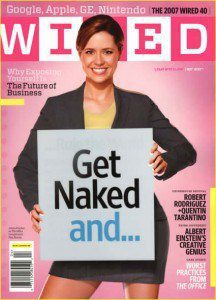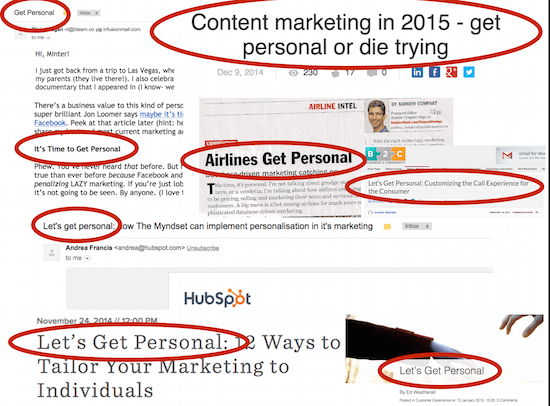Some industries — such as fashion, food, magazine — seem to have a wildly plethoric spread of brands. So many brands, so little distinction or personality. In this post, I want to push further why it’s important that any marketing branding strategy gets personal.
For many consumers, they are left to ask the question:  what is to distinguish between them? And, frankly, often times, I think the answer is that there is really no sound difference. The products are rather equal, if not bland. The layout is rather unremarkable. Even the employees are interchangeable. So many brands just seem to exist for the purposes of surviving the lifespan of the founder. They smack of just making a living. And, of course, that’s a choice and that’s fine for some brands. However, for the brands intending to be around for the long haul (i.e. after the current CEO moves on), that type of indistinguishability is less forgiving. And the challenge is all the more complicated for those brands that are part of larger organizations (i.e P&G, Unilever, L’Oreal…).
what is to distinguish between them? And, frankly, often times, I think the answer is that there is really no sound difference. The products are rather equal, if not bland. The layout is rather unremarkable. Even the employees are interchangeable. So many brands just seem to exist for the purposes of surviving the lifespan of the founder. They smack of just making a living. And, of course, that’s a choice and that’s fine for some brands. However, for the brands intending to be around for the long haul (i.e. after the current CEO moves on), that type of indistinguishability is less forgiving. And the challenge is all the more complicated for those brands that are part of larger organizations (i.e P&G, Unilever, L’Oreal…).
Making a difference
We’re all working hard, fighting with the same 24-hour constraint, making what we believe are the best quality products for the price we have established with the resources at our disposition. Yet, some brands are bound to succeed better and longer than others… There’s obviously no single, fast recipe. However, to the extent life is short — even for employees — you wonder why owners and leaders don’t try harder to make a difference? What does your brand stand for, really? The issue is moving from a statement written on a lovely brochure, in an annual report, or on the wall by the reception and having that mission embodied throughout the organization, out through the partners and wider stakeholders.
Finding a voice
At the RIA Novosti Future Media Forum in Moscow last week, I was lucky enough to be on a panel with the ever captivating Chris Anderson (Wired, etc.) and he spoke about the need for media to have a voice, an opinion. Truly, the same should be said for brands. Brands are media (just as you and I are, if we so wish). If brands are to have an opinion, that opinion needs to be shared and voiced by the entire company, i.e. by the staff. That statement has far ranging consequences for brands, much less those that are embedded in larger organizations where career path equals interbrand movement.
Strong brands are bands — a community that shares similar values. {Click to tweet!} The strongest brands have a sense of purpose, a defining mission that is shared by engaged employees, who are the first and biggest fans. {Click to tweet!} The great brands know how to make more than a living, and put life into the business. These brands put the “are” into living and being.
Branding gets personal
It is for this reason that I maintain that branding needs to get personal. Starting at the recruitment phase, it is vital that employees feel that they belong and can contribute. As Christine Day, the ex-CEO of Lululemon, once said of her company: “it’s a place where I can bring my whole self to work.” Magical words if you can make that a reality. You need to believe! If the CEO doesn’t live it, then it’s a tough call to expect the rest of the team to buy in.
Are you living your brand as if you owned it? Are you your brand?
Your thoughts welcome!













Hi Minter, it was great seeing you again in Moscow. Thanks for this inspiring piece on branding. If branding is to get personal, then employees should treat their company's brands as they would their colleagues at work: respect them for their strengths and be constructive about their weaknesses. These feelings should not be blind, however. Great brands, no matter the positioning, seem to enjoy a balance of between internal and external perception, positive in both cases.
Hi Minter, it was great seeing you again in Moscow. Thanks for this inspiring piece on branding. If branding is to get personal, then employees should treat their company's brands as they would their colleagues at work: respect them for their strengths and be constructive about their weaknesses. These feelings should not be blind, however. Great brands, no matter the positioning, seem to enjoy a balance of between internal and external perception, positive in both cases.